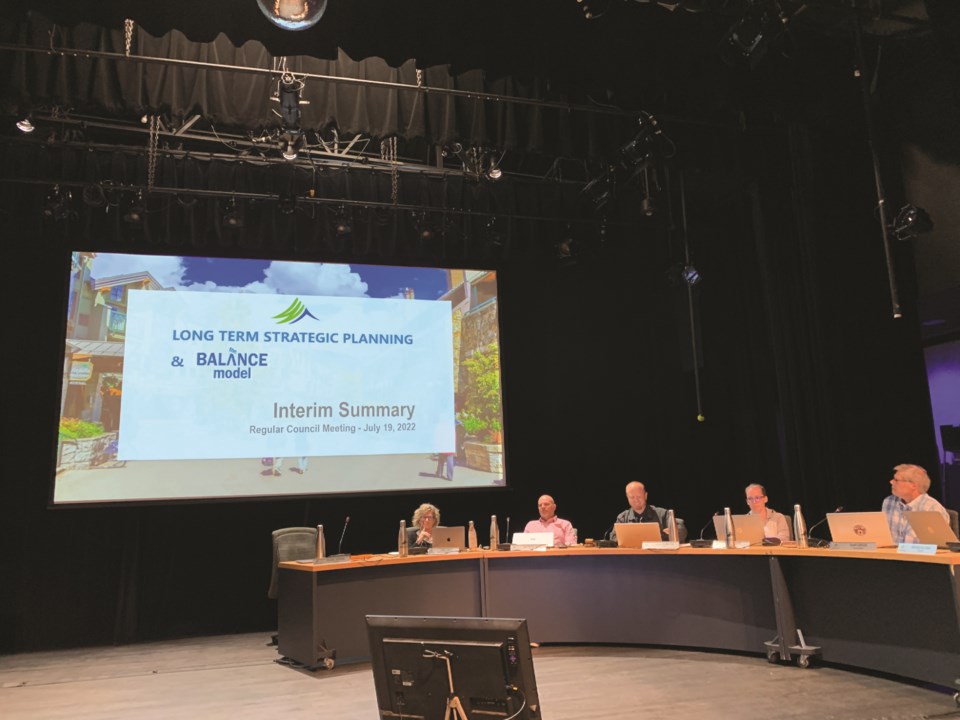With the implications of potential “unconstrained growth” firmly in mind, the Resort Municipality of Whistler (RMOW) is moving to Phase 3 of its Balance Model Initiative, which will explore strategies and actions to ensure a manageable future for Whistler.
At the July 18 council meeting, staff presented a new long-term strategic planning interim summary report on the Balance Model Initiative, marking the beginning of Phase 3.
So far, the Balance Model has used statistics and local data to highlight worrying trends related to things like potential population and visitor growth, increased workforce shortages and traffic congestion in the resort.
“We’ve identified three big areas of focus that we are calling foundational ... because they are building blocks, and they set the foundation for everything else as a result without any significant further intervention,” said RMOW manager of economic development and tourism recovery Toni Metcalf, in a presentation to council.
“The three are housing, transportation, and demand management. We have picked these three because they go across the breadth of our Official Community Plan vision and goals, they impact the community, they impact our economy. They also impact the environment, which is super important because that impacts everything.”
To address these three key areas, seven fundamental principles have been developed in workshops with community stakeholders, including members of the Strategic Planning Committee, Transportation Advisory Group, Economic Partnership Initiative and the environmental non-profit AWARE.
The seven principles are guided by the BALANCE acronym:
• Balance considers the interconnectedness of the number of visitors with workers needed and how both economic and community needs can be sustained;
• Availability of and access to housing requires a sustained increase in supply;
• Labour efficiencies are needed with a coordinated approach;
• Active participation of all resort stakeholders and citizens to enable change, step by step;
• No single initiative on its own can deliver balance;
• Climate goals will not be achieved without radical intervention, and;
• Evaluating performance requires new metrics.
Finding solutions
Along with the principles, the interim summary report includes discussion points around potential solutions to some of the municipality’s complex challenges.
To address the current housing crisis, the report notes there would need to be a significant increase in the supply of resident-restricted employee housing, which needs to be built at a faster pace than what is currently being delivered as the demand for labour outstrips the current rate of development.
The report also highlighted Vienna’s municipal housing program, which has built rental housing throughout the Austrian capital. The housing is delivered by the municipal government, private developers and social enterprises on city-owned lands and is similar to the existing Whistler Housing Authority (WHA).
Currently, employee-restricted housing makes up approximately 16 per cent of the total residential accommodations in the municipality.
The report noted that 1,000 new employee restricted beds have been approved since the Mayor’s Task Force on Resident Housing was struck in 2017, and are currently in rezoning application or building permit processing. Factoring in the new beds brings the total of employee-restricted beds to about 7,500 bed units—18 per cent of the municipality’s total residential bed units.
Another intriguing idea is offering temporary mobile housing for Whistler’s workforce, to “take advantage of the growing trend for temporary workers choosing a more mobile lifestyle,” as the report puts it.
The idea would be to create a transitional solution that includes transforming lands slated for future development into a location for temporary workers who have their own mobile homes, or who may lease onsite mobile tiny houses for a maximum one-year term.
“We need to build a lot of housing, but we need to also understand the community effects of building more housing, and using the housing we have to its maximum efficiency is very important,” said Councillor Jen Ford.
“So I think that whatever creative solutions come, everything is on the table as far as how we can be efficient in using not only the employee housing that we have in town but all of the housing.”
Radical intervention
Given that Whistler will miss its climate targets “without radical intervention,” the report also floats some big ideas for reducing emissions: building overhead trams (like Vancouver’s SkyTrain) to move people more efficiently throughout the municipality; creating a visitor reservation system for transit and parking; bringing back passenger rail service to Pemberton; and creating a BC Transit service to Squamish.
Some shorter-term ideas that could be implemented relatively easily include paving and painting a priority lane on Highway 99 for bus prioritization, enhanced Valley Trail maintenance for winter bike commuters and creating a park-and-ride service with reservation systems.
Coun. Arthur De Jong appreciated the harsher language used for the guiding principles.
“I appreciate that the language [makes it clear that our] climate goals will not be achieved without radical intervention. I certainly took some criticism from some of our environmental committees that we weren’t pushing hard enough there, with that language,” said De Jong.
“The other thing I often worry about is this is very much about capacity analysis at our resort as it’s managing its maturity. We’re always just one world crisis away from bleeding for business, and the language is in there, too, that we need to be adaptive, humble, [maintain] the ability to pivot quickly as we have over the last few years, so we should never lose sight of that.”
From here, staff will further develop ideas generated from the workshops into coordinated sets of actions that can be implemented and prioritized with a short-term and longer-term focus. Staff will also engage with the Lil’wat and Squamish Nations on the insights and implications arising in the report through the Economic Development Committee.
RMOW staff plan to hold broader community engagement opportunities related to Phase 3 of the Balance Model Initiative in November to inform a final report. Once the consultations are finished, recommendations and a final report will be brought before Whistler’s new mayor and council in 2023.





